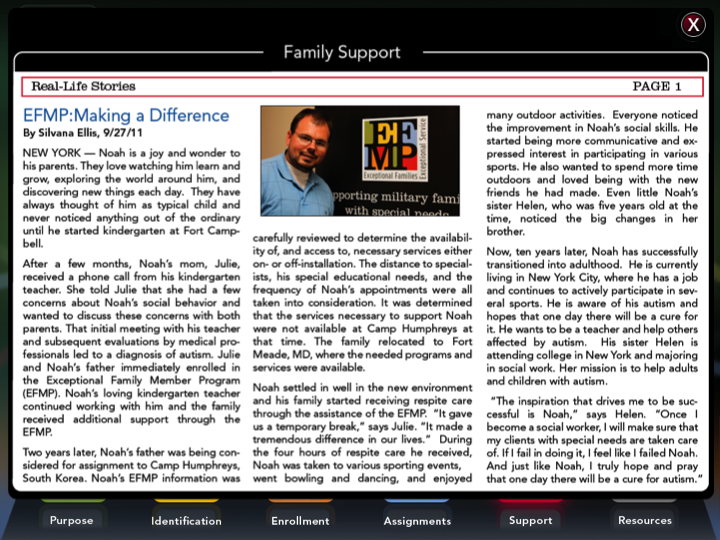

Image of a newspaper titled Real-Life Stories, article titled E F M P: Making a Difference. By Silvana Ellis, 9/27/2011. Text reads: NEW YORK — Noah is a joy and wonder to his parents. They love watching him learn and grow, exploring the world around him, and discovering new things each day. They have always thought of him as typical child and never noticed anything out of the ordinary until he started kindergarten at Fort Campbell. After a few months, Noah’s mom, Julie, received a phone call from his kindergarten teacher. She told Julie that she had a few concerns about Noah’s social behavior and wanted to discuss these concerns with both parents. That initial meeting with his teacher and subsequent evaluations by medical professionals led to a diagnosis of autism. Julie and Noah’s father immediately enrolled in the Exceptional Family Member Program (E F M P). Noah’s loving kindergarten teacher continued working with him and the family received additional support through the E F M P. Two years later, Noah’s father was being considered for assignment to Camp Humphreys, South Korea. Noah’s E F M P information was carefully reviewed to determine the availability of, and access to, necessary services either on- or off-installation. The distance to specialists, his special educational needs, and the frequency of Noah’s appointments were all taken into consideration. It was determined that the services necessary to support Noah were not available at Camp Humphreys at that time. The family relocated to Fort Meade, M D, where the needed programs and services were available. Noah settled in well in the new environment and his family started receiving respite care through the assistance of the E F M P. “It gave us a temporary break,” says Julie. “It made a tremendous difference in our lives.” During the four hours of respite care he received, Noah was taken to various sporting events, went bowling and dancing, and enjoyed many outdoor activities. Everyone noticed the improvement in Noah’s social skills. He started being more communicative and expressed interest in participating in various sports. He also wanted to spend more time outdoors and loved being with the new friends he had made. Even little Noah’s sister Helen, who was five years old at the time, noticed the big changes in her brother. Now, ten years later, Noah has successfully transitioned into adulthood. He is currently living in New York City, where he has a job and continues to actively participate in several sports. He is aware of his autism and hopes that one day there will be a cure for it. He wants to be a teacher and help others affected by autism. His sister Helen is attending college in New York and majoring in social work. Her mission is to help adults and children with autism. “The inspiration that drives me to be successful is Noah,” says Helen. “Once I become a social worker, I will make sure that my clients with special needs are taken care of. If I fail in doing it, I feel like I failed Noah. And just like Noah, I truly hope and pray that one day there will be a cure for autism.”
Select the close button (X) to return to the previous screen.